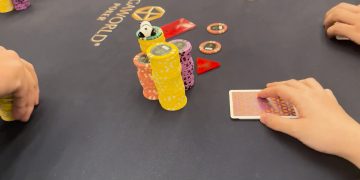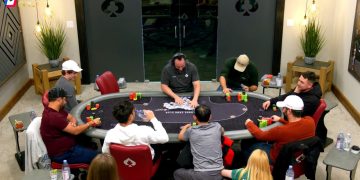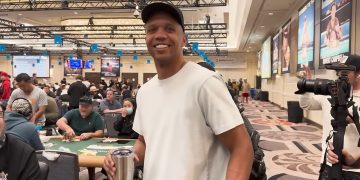The Seminole Hard Rock Tampa poker room is home to many poker tournament games. In fact, it might have the best weekend tournament structures I have seen. For example, every Sunday, they host a $200 Triple Stack. It’s called the Triple Stack because you get 30,000 chips. This is excellent for a $200 buy-in as long as the blind levels don’t jump like crazy, which they don’t.
Buying-In Late to Poker Tournament Games:

On this particular Sunday, I didn’t know about the Triple Stack until I was in line to collect my payout receipt for the Little Slick tournament (96th of 2,111 for $584). The Triple Stack was already on Level 6, but you can buy-in through the break after Level 9, and I prefer to buy-in late anyway.
If you’re not already familiar with why I like to buy-in late, I’ll cover it again briefly. Even if you already read this information, it’s good to have a refresh so it sticks in your mind better. And this applies to all poker tournament games, not just Texas Hold’em poker tournaments.
The most important reason to buy-in late for poker tournament games is that you’re saving buy-ins. There is no better way to go out of business in poker tournaments than by consistently buying in on Level 1. Even if you’re the best player in the world, you’re going to run into situations: AA vs. KK, AK vs. AA, AK vs. QQ, etc.
These are the types of duels where the pot has the potential to build until one player is all-in. Even if that’s not the case, you still have top pair vs. a flush draw on the flop, a set vs. a flush draw on the flop, a set vs. a straight draw on the flop, and so on.
Busting Out Early
What do you think happens when that poker player busts? He doesn’t look into other poker games in the regular poker room. He walks straight to the counter and re-buys. Let’s say this is a $400 buy-in tournament. He’s now in for $800. If it’s a small field, he’s going to need to climb very high just to get his money back. If it’s a large field, he’s going to need to outlast hundreds, if not thousands, of people just to get his money back.
Let’s say one of the above scenarios happened on Level 1, 2, 3, 4, 5, or 6. If it’s one of the earlier levels, he will see that as a bad bullet and need to start again. If it’s one of the later levels, he’s going to assume he played well enough to make it through five or six levels and deserves another shot. Sometimes it will work out, but usually it won’t. It’s difficult to cash in Texas Hold’em poker tournaments. The key is to have the big cashes carry you for the year.
Even if you buy-in at Level 7, it’s difficult. You’re likely coming in with a slightly below average stack. However, if you buy-in at Level 7 for your first bullet, it’s literally impossible to lose in Levels 1-6. In most cases, you only have 2-3 levels to go before re-buys are over. Therefore, instead of just looking at the top line (earnings) also look at the bottom line (net profit). If you cut your expenses, you’re going to have a stronger bottom line. If you buy-in late, you’re greatly reducing your risk. Even if you fail to make the money, firing just one bullet saves you money and keeps you involved in the poker tournament games you love so much.
Other advantages to buying in late include: not succumbing to boredom, having more energy than your opponents, not giving away information to your opponents for hours, easier play due to higher blind levels, and having several hours during the day to get out and see the world, or at least some time to go eat lunch somewhere outside of the casino. The latter point might not seem important to someone who doesn’t travel for poker tournament games, but it has a positive impact on your state of mind.
Short-Stack Poker Rules for Poker Tournament Games

In this instance, I didn’t buy-in late on purpose. I didn’t even know the tournament was running. Someone in the payout line in front of me was talking about poker tournament games and mentioned it to his friend. That’s when my ears perked up. Of all the poker tournament games in the world, nothing is more exciting to a poker player than a deepstack tournament.
I bought in to the Triple Stack on Level 7 with 30,000 chips, sat down, and noticed that half the table had more chips than me and half the table had fewer chips than me. I was right where I wanted to be. It’s not a bad thing for half the table to have more chips than you. It’s an opportunity. Sometimes, poker players will call the shorter stacks light in an attempt to knock them out, but that’s poor poker strategy because it can do a lot of damage.
Most players think it’s in the poker rules that you need to knock out an opponent when you have a chance, but that’s wrong. Usually, you play the player if you’re really good, but when a short-stack shoves on you, you’re strictly playing the cards.
For instance, what if you have KJ-off? Do you really want to call there? You’re likely behind, but even if you’re ahead, your opponent is live. It’s a risky spot. There are certain poker hands you should call with in that spot, which is often AJ-off or better. That’s 19 starting poker hands you’re calling with—AJ-off is the 19th best starting hand in the game.
Fortunately, I wasn’t short-stacked and had no early situations where I had to call a short-stack with a hand I didn’t like. I grinded my stack to 80k, got it to 96k for a brief moment, then it went back down to 80k. There were 199 players and I sat at exactly 80k before re-buys ended. By hanging out and playing tight for about 10-15 minutes, I knew they would post the remaining players and payout information, which would give me a better idea of where I stood prior to formulating a game plan.
Post-Break Information
199 players was just shy of 100 after the break, but the average stack was 132k. I attempted to pick my spots with strong hands, but I had second-best on three occasions. Fortunately, my reads were on and I folded all three times, which allowed me to minimize my losses. Patience and anti-ego are close relatives and are the number one priorities in poker tournament games, but reading ability is also toward the top of the list. I’ll give you one example below.
A Decent Read
A loud and aggressive player was in a three-way pot with me. He was in the Small Blind. All limps and a check pre-flop.
I held
![]()
![]()
from the Big Blind on this flop:
![]()
![]()
![]()
The loud and aggressive player bet and myself and the player to my left called.
Turn:
![]()
The loud and aggressive player checked, as did I and the player behind me.
River:
![]()
The loud and aggressive player hesitated, then put out a 4k bet when the Big Blind was 2k (minimum bet). I called. Below was my reasoning.
If the loud and aggressive player hit the ten on the flop, he would have checked. If he had bet out on the flop and I called, he would have continued his assault on the turn, figuring me for the eight. The loud and aggressive player then checked the turn. If he had a heart draw, he bets out every time. Loud and aggressive players might think they’re cool, but they’re also predictable. When the loud and aggressive player bet the river, I felt comfortable with my call because he would always raise pre-flop with an Ace from the Small Blind.
As far as the player to my left goes, I could simply tell by his mannerisms that he wasn’t enthused about the hand and felt like he shouldn’t have been in the pot, which told me he had a gut-shot straight draw. He folded.
When I called with King-high, the loud and aggressive player said, “You got it” prior to seeing my hand. He tabled K7-off, the same hand, then saw my hand and ran over to me and jokingly punched me on the arm, saying, “Are you serious?”
We chopped it, which was fine. I thought my hand would be the winner, but oh well. Either way, these are NOT the types of poker hands you must win when playing in poker tournament games. In fact, hero calls will get you into a ton of trouble. Stay away from plays like this unless you have an incredible read. Wait for a better spot. Whenever you’re not sure, wait! It will come (usually).
Applying Tilt
Here’s a little poker strategy for you. It’s not a kind move, but it’s not against the poker rules, either. The loud and aggressive player mentioned above had 160k when I sat down and now had about 115k. He also just told the table that he had plenty of chips and would be fine. This is when I knew his downfall was near, but I felt the need to expedite the process.
When it was just me and him in the blinds again on the next orbit, he limped and I raised four times the bet. He tanked. Said something I never say, and talking about poker hands is against the rules in poker tournaments, but I had noticed that they usually let it slide at this venue. I said, “I’ll show it to you.” That’s a normal comment, but I needed to add a little sauce. “I don’t care. You know I haven’t messed around yet.”
He folded, and I tabled 54. The majority of the players at the table didn’t like my opponent because he was loud and aggressive, so they loved it. He did not. He lost all his chips within 30 minutes. Once an ego player is embarrassed, they’re toast.
This is something I only recommend applying if you’re experienced in poker tournament games. This goes beyond regular poker.
Final Thoughts: Triple Stack Results
I fell into the too-careful trap toward the end of this tournament. Kept waiting for at least a halfway decent hand to shove with when I was short-stacked and approaching bubble territory. I kept telling myself it would happen on the next hand. Even JT or Q9 would do. I had literally only seen one Jack and nothing higher for three orbits. Usually, being patient and picking the right spot to shove works for me, but it didn’t in this case and I was somewhat blinded out (a rarity). I ended up having to call an all-in from the Big Blind (5 BB) with Js 2s. Was up against 55, which held.
I finished this tournament 33rd of 199. That’s not bad, but it’s obviously not good enough since they were only paying top 10%. I didn’t run good at all the last 1.5 hours and did everything I could. In hindsight, I might have had a slight chance if I shoved with hands like 42-off and 73-off from middle position, hoping to get some folds. But there is no way I could know my starting hands wouldn’t improve. See you at the WSOP!
♠ pokerjournal.org


















Discussion about this post